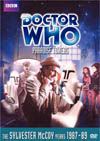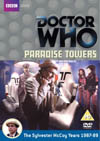DVD Extras include:
"Paradise Towers" also initiates this era's hefty indulgence in the "Candy-Horror" subgenre in Doctor Who, which hasn't really had more than two substantial outings in the previous 23 years. In such stories, not only are things one would normally regard as cute or sweet now much more deadly, but in accommodating this they go so far as appearing that the rules of normal reality don't seem to apply. However, both "The Celestial Toymaker" (story no. 24), and "The Mind Robber" (story no. 45) utilize the freedom of mental-based dimensions to make credible the idea that such rules won't apply. Finding reasons as good in the Sylvester McCoy Era is not nearly as easy.
One of the first questions that goes both unanswered and unasked is, just where in creation are we today? No doubt some viewers will choose to believe that the story takes place in some run-down building on Earth in the future, while I initially came to my recent viewing prepared to build a case that the story more likely takes place on another colonized planet, where it would enjoy greater artistic freedoms. In the televised story, Melanie makes mention that if they can't find a suitable swimming pool here, they'll have to try yet another planet, which is the best indication that we're not on Earth today, and the Doctor rattles off a few names of other planets they might go to. Great, but why don't they tell us where we are, instead of where we aren't? All this becomes a moot point when one picks up writer Stephen Wyatt's novelization. Both the back-cover blurb and the prose on page 1 establish Paradise Towers as the main feature on a man-made planet. Awesome sci-fi concept! Well worth exploring! Why isn't that anywhere in the TV episodes? With this tale's obsession with architecture, you have to wonder why such good bits get so ignored. Another untackled point is whether the story is populated with Earth humans, or aliens of some other humanoid race. The scene of the Doctor and Mel meeting the Red Kangs exemplifies this, as it proceeds along lines best suited for creatures with whom one shares no common type of language. If they are human beings, our regulars' first contact with them is unbelievable in its complexity. If they are aliens, cultural differences can take up some slack - and this needs to be properly set-up to prevent the tale from flopping. Perhaps they speak too much good English already for communication to be the big problem that it is. Another idea for making them more believable (though perhaps only slightly so) would be to have them played by actual children, indicating a sort of "Lord of the Flies" situation. The story "Miri" from original Star Trek's first season was much more successful at hitting the right note. But, the Red Kangs feature so heavily, that with extra rules governing the work time of child actors and Doctor Who's schedule being so cramped already, this wouldn't automatically be feasible. One has to really take a step back from the bizarreness of this tale, try and figure out what it is trying to do artistically with its global metaphors, and judge it based on that first and foremost. And "Paradise Towers" remains slippery even here, saturated with examples of what doesn't work in society (or on television for that matter). The one point that does inject something worthwhile is that all the various factions that were originally working against each other come together for a common cause in the end. While that is noble, it must also be noted that what they actually do together is conspire to commit another murder - which hinges on the big villain having unexplained and unbelievable powers of control over the entire setting. Better would have been an exploration of those mechanisms of control, followed by their permanent defusement, along with a demonstration by our team of good guys that they've evolved beyond violence and learned what creates better societies. Without that, one can easily wonder what kind of horror these people are about to collectively come up with next. The bulk of the story's main premise actually seems more concerned with fostering corny old horror ideas and literally adorning them with rubbish. The brain take-over in the basement is the biggest central flop in that premise, not resulting in anything that works well on screen for the adventure. And there really isn't anything else in the story that can really justify the level of insanity that most other characters have degenerated into. Build High for HappinessIndeed, the whole premise is urbanized to a degree that it doesn't even remember how to aim for any naturally good ideals. When discovering how to operate a soda-pop vending machine becomes a social highlight in a story, your values are in real trouble.
Although many of the performances here end up being cringeful at times, largely due to the audience having no way to find credibility or empathy with the bizarreness of it, every once in a while the actors are able to pull off some really nice moments. In fact, I actually quite like Clive Merrison (Deputy Chief) in this one, who has a chance to make much more of a close-up impression here than in his minor role in "The Tomb of the Cybermen" (story no. 37). Elizabeth Spriggs as Tabby also delivers a large quantity of good moments, balancing the cute with the menacing quite nicely. Richard Briers has his moments as the Chief Caretaker whenever intentionally humorous moments come to the fore, but his second role in the story during the last act is a complete flop. The villainous forces aren't really working in this tale in any form. The contraption in the basement hasn't got anything going for it audio-visually. At least the script builds a bit of mystery around it, but not until part two, and by part three the mystery is thrown away and has given way to disappointment. The cleaner robots also fail to inspire the menace that they are clearly meant to. The design is too artsy where it should simply focus on functionality first, and its three arms prove incapable of succeeding at any task - not surprising as they're attached to the rest of the robot as if it were in a couch-potato posture. This alone lets down much of the action and drama here, even if it isn't the adventure's most fundamental flaw. If you want to see good action from the cleaners, you're better off looking for them in fan modifications of Doom II, or other such sideline by-products. But when all is said and done, I do like Sylvester McCoy in this one. He is getting a firm handle on his version of the character here, and injecting a lot of good moments of drama and humour into the show, even if he can't manage to salvage the action with the cleaners.
Part Two of Paradise Towers is probably the best episode, where most of the things that can work well are showcased, and enough unknowns are still alive that one can hope for answers that will excuse the things that don't appear to make sense. However, this story really put very little on the screen that viewers like me tune in to see - not even in terms of the oft-referred-to architecture. The grubby corridors profusely littered with garbage are the opposite of the eye-candy I usually appreciate, and with Wyatt thinking the story would have been better with an even more dilapidated look, I think he and I are at cross-purposes with our hopes for this show. No lasers today, and only the barest minimum done to demonstrate the TARDIS, which gets no action other than dropping the regulars into the setting, and is ultimately still far more interesting than anything in the main adventure.
International Titles:Deutsch: "Der Fluch des Kroagnon"Magyar: "Paradicsom tornyok"Français: (Les Tours Paradis)Русский: "Райские башни"Here the Germans decided to call this one "The Curse of Kroagnon" - a fair alternative, but not one I'd prefer.Bizarrely, the Hungarian word for "tomato" can also be used for "paradise", so their title appears to suggest "Tomato Towers" - and considering both the grubby state of the interior sets and my assessment of the adventure's artistic qualities, perhaps more rotten tomatoes have been thrown here than fresh ones. I think I may prefer this translation above the others just for its humorous potential.
This story has become available on DVD and VHS video. Click on the Amazon symbol for the location nearest you for pricing and availability:
Comments on this article are welcome. You may contact the author from this page:
|









